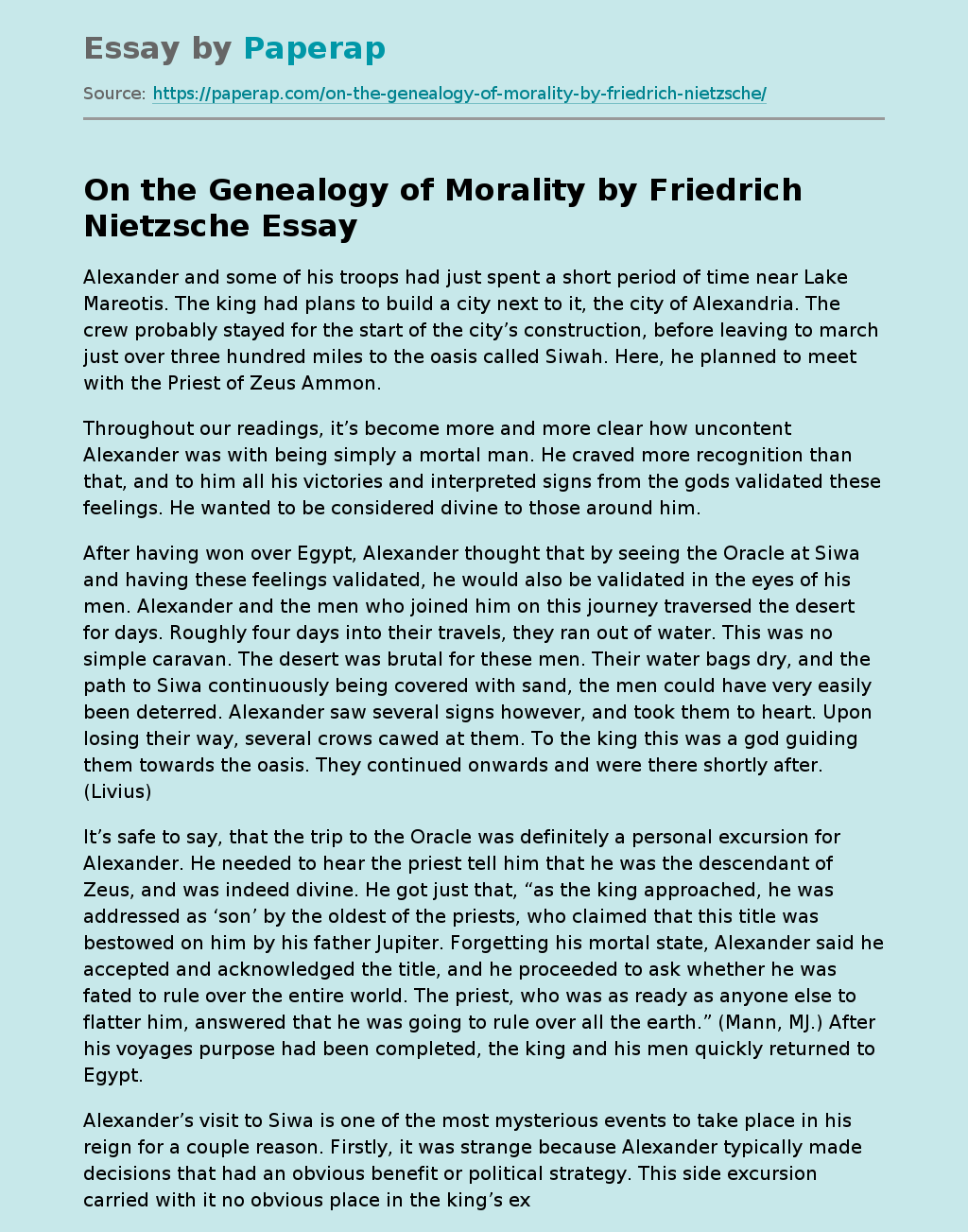On the Genealogy of Morality by Friedrich Nietzsche
Alexander and some of his troops had just spent a short period of time near Lake Mareotis. The king had plans to build a city next to it, the city of Alexandria. The crew probably stayed for the start of the city’s construction, before leaving to march just over three hundred miles to the oasis called Siwah. Here, he planned to meet with the Priest of Zeus Ammon.
Throughout our readings, it’s become more and more clear how uncontent Alexander was with being simply a mortal man.
He craved more recognition than that, and to him all his victories and interpreted signs from the gods validated these feelings. He wanted to be considered divine to those around him.
After having won over Egypt, Alexander thought that by seeing the Oracle at Siwa and having these feelings validated, he would also be validated in the eyes of his men. Alexander and the men who joined him on this journey traversed the desert for days.
Roughly four days into their travels, they ran out of water. This was no simple caravan. The desert was brutal for these men. Their water bags dry, and the path to Siwa continuously being covered with sand, the men could have very easily been deterred. Alexander saw several signs however, and took them to heart. Upon losing their way, several crows cawed at them. To the king this was a god guiding them towards the oasis. They continued onwards and were there shortly after. (Livius)
It’s safe to say, that the trip to the Oracle was definitely a personal excursion for Alexander.
He needed to hear the priest tell him that he was the descendant of Zeus, and was indeed divine. He got just that, “as the king approached, he was addressed as ‘son’ by the oldest of the priests, who claimed that this title was bestowed on him by his father Jupiter. Forgetting his mortal state, Alexander said he accepted and acknowledged the title, and he proceeded to ask whether he was fated to rule over the entire world. The priest, who was as ready as anyone else to flatter him, answered that he was going to rule over all the earth.” (Mann, MJ.) After his voyages purpose had been completed, the king and his men quickly returned to Egypt.
Alexander’s visit to Siwa is one of the most mysterious events to take place in his reign for a couple reason. Firstly, it was strange because Alexander typically made decisions that had an obvious benefit or political strategy. This side excursion carried with it no obvious place in the king’s exploits and campaigning, besides one of personal interest. Lastly, this trip has such a wide variety of interpretations that it’s become a bit of an enigma itself, and has become such a mashup of fact and legend. It’s an important event in Alexander’s life however, as it was a concrete mark in his steps towards securing his immortal status.
Alexander’s Drinking Habits
Today, we know what alcoholism is and the effects on those it controls. The signs we tend to associate it with are excessive drinking patterns, an obvious dependency, mood changes like anxiety and paranoia. Alcoholism is a big culprit for behavioral and mood changes. A person deep into alcoholism might develop discontent in their life, they may begin secluding themselves to some extent or blocking people out, as well as changes in demeanor. They might become more aggressive or easily angered. Alexander definitely displayed this the night he killed Cleitus. He acted in a self-destructive way as well as an obviously harmful way towards others. It was a very compulsive reaction and he couldn’t restrain himself. Afterwards he felt guilty for days. These are all characteristic signs of drinking habits gone very wrong, and it seemed that Alexander showcased them all in some way or another.
We’ve read of Alexander’s excessive drinking at parties and feasts he had put on, and from the sound of it all, it seems like he probably drank quite a lot at other times as well. I think history tends to display Alexander’s impulses and reactions to anything or anyone that took a jab at his character as something spurred by too much power or the regards he was beginning to hold himself. But his drinking habits might have played a huge role in his behavior. The killing of Cleitus really is a prime example. It was apparent he felt a lot of remorse about killing someone so abruptly over a dinner argument, especially someone who had previously saved his life. Throughout our readings we see Alexander’s behavior deteriorating. He starts acquiring a hefty amount of paranoia and anxiety about plots against him.
In the chapter on the death of Alexander, we see that some people think he was poisoned while others felt his excessive drinking as well as battle wounds were a good indicator. He may have picked up some disease as well. (Alexander Reader, page 297)I think that the excessive drinking he took part in during the feast he held (12 pints of wine!) had a huge role in his death. The intense stomach pain, the blacking out, and general state of illness had at least been triggered by the drinking. I’m not certain how long alcohol poisoning takes to kill a person, but I’m sure it’s not a pleasant process.
Alexander’s character was in part built by his drinking habits. It would be an interesting thing to see how differently he would have lead without the influence of alcohol. He was both strategic but compulsive, intelligent but disillusioned at times. In conclusion, we’ll never know for sure how Alexander’s drinking habits built him, and broke him down, but all the signs point to him having been an alcoholic.
On the Genealogy of Morality by Friedrich Nietzsche. (2021, Dec 08). Retrieved from https://paperap.com/on-the-genealogy-of-morality-by-friedrich-nietzsche/

